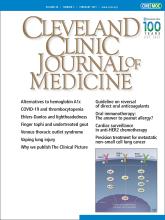Article Information
PubMed
Published By
Print ISSN
Online ISSN
History
- Published online February 1, 2021.
Copyright & Usage
Copyright © 2021 The Cleveland Clinic Foundation. All Rights Reserved.
Author Information
- Wendy O. Henderson, MD
- Mary H. Parker, PharmD, FASHP, FCCP, BCPS, BCCP⇑
- Acting Chief Medical Officer, VA Mid-Atlantic Health Care Network (VISN6); Clinical Coordinator/Clinical Pharmacy Specialist, Pharmacy and Ambulatory Care, Durham VA Health Care System, Durham, NC
- Address:
Mary H. Parker, PharmD, FASHP, FCCP, BCPS, BCCP, Pharmacy and Ambulatory Care, Durham VA Health Care System, 508 Fulton Street (11-C), Durham, NC 27705; mary.h.parker{at}gmail.com






